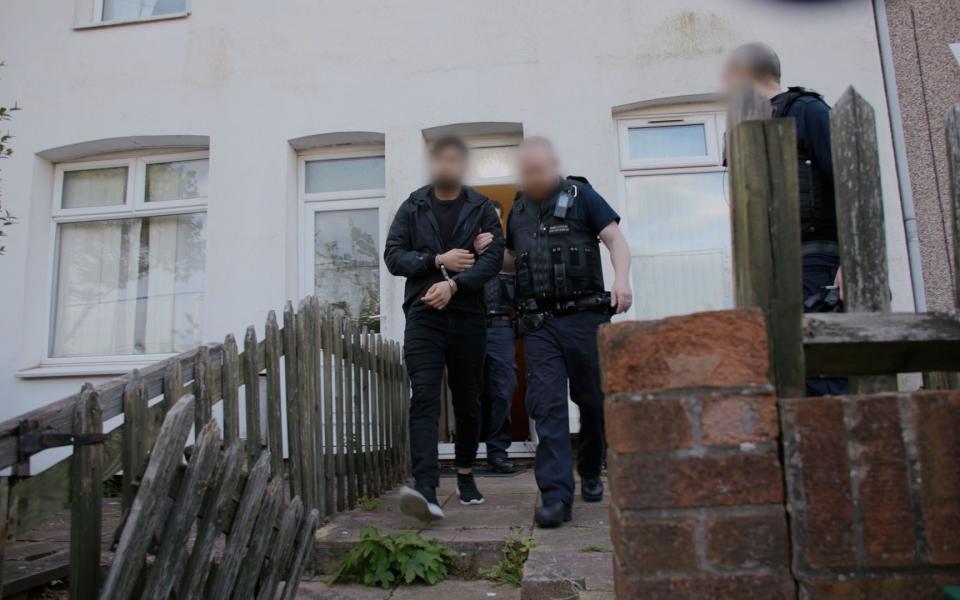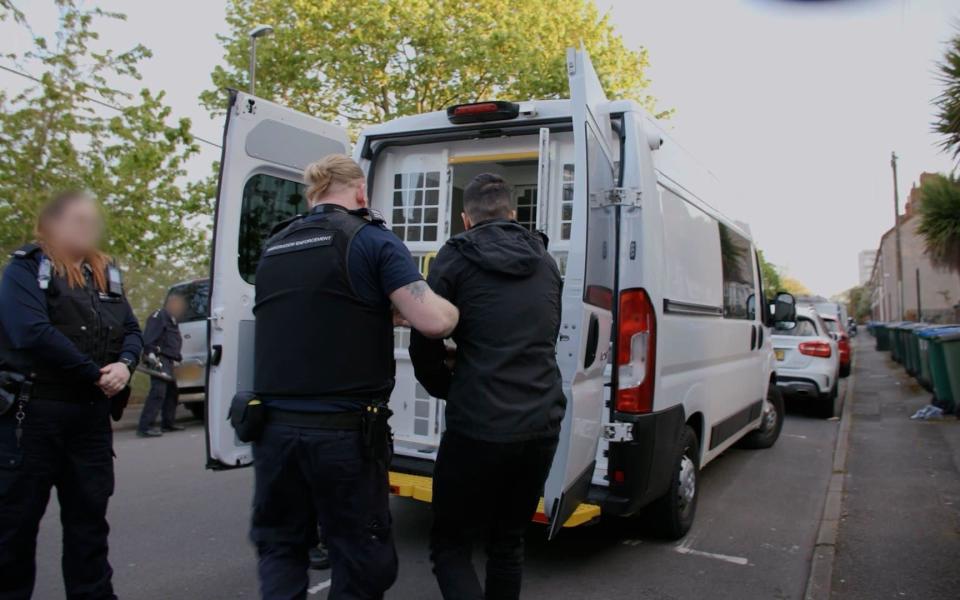Women seized in immigration raids ahead of Rwanda deportation flights
Women earmarked for deportation to Rwanda are among the first migrants to have been detained in nationwide raids that sparked protests by groups including Just Stop Oil.
Immigration enforcement officials started detaining migrants on Monday morning ahead of the first deportation flights that are scheduled to take off in nine to 11 weeks.
Women were among those picked up, despite young men forming the majority of Channel migrants. They will be detained at immigration removal centres until they can be deported to Rwanda in July.
Some 800 immigration officers are involved in Operation Vector, which saw protesters try to block the detention of migrants in Solihull, Swansea, Salford and Croydon. Just Stop Oil mounted a protest at Solihull’s immigration enforcement offices, with 10 people understood to have been arrested.
Some migrants were detained when they arrived for routine appointments while others were arrested after failing to comply with reporting requirements.
Pictures and a video released by the Home Office showed uniformed immigration officers mounting a dawn raid with an asylum seeker placed in a caged white van to be transported to detention.
The male migrant was escorted handcuffed from the detached house after the officers entered it. One officer carried a handheld battering ram ready to break down doors.
Those detained are among 5,700 migrants whose applications for asylum have been denied after arriving in the UK illegally between January 2022 and June 2023. They were previously notified of their removal to Rwanda.
Officials are targeting 2,145 whom they believe give them the best prospect of removal and have been subject to face-to-face reporting as part of the immigration bail conditions. The remaining 3,557 migrants are subject to reporting conditions including by email or phone.
They will be detained at seven immigration removal centres, where detention capacity has been expanded to 2,200 places, although they will also be required to hold foreign criminals and other immigration offenders already facing deportation.
‘A complex piece of work’
James Cleverly, the Home Secretary, said: “Our dedicated enforcement teams are working at pace to swiftly detain those who have no right to be here so we can get flights off the ground.
“This is a complex piece of work, but we remain absolutely committed to operationalising the policy, to stop the boats and break the business model of people smuggling gangs.”
Eddy Montgomery, the Home Office director of enforcement, said it was “vital that operational detail is kept to a minimum, to protect colleagues involved and those being detained, as well as ensuring we can deliver this large-scale operation as quickly as possible”.
The migrants can be detained for the entire nine to 11 weeks before their scheduled flights provided there is a realistic prospect of removal from the UK in a “reasonable” timescale.
They will be able to seek bail but lawyers suggested Mr Cleverly would have to provide a removal date at that point to justify their detention and the “reasonable” timescale.
A key change to guidance issued to officials on Tuesday makes clear it is now for the Home Secretary to determine what a “reasonable” timescale is and also makes it easier to detain individuals who may be deemed vulnerable.

Lawyers believe they will be able to mount legal challenges to individual migrants’ deportation under the Safety of Rwanda Act even though the legislation was designed to restrict appeals.
Migrants can bring legal claims if they can provide “compelling evidence relating specifically to the person’s particular circumstances” that Rwanda is not a safe country for them individually.
Legal challenges will be based on articles 2 and 3 of the European Convention on Human Rights (ECHR), which protect the right to life and guard against torture.
How migrants could challenge removals
Campaigners suggested migrants would be able to challenge the removals on the basis of potential harm to their mental and physical health and that those with a history of protest would also have a strong case.
This will be based on the Rwandan authority’s previous management of protests staged by refugees, as evidence of the potential harm that their clients would face in the country.
The Rwanda Act also allows for migrants to seek injunctions, known as interim relief, which would suspend the implementation of the policy until there had been a full legal hearing.
Claimants will have to prove that they face “a real, imminent and foreseeable risk of serious and irreversible harm” if sent to Rwanda before a full legal hearing could take place.
Of the 5,700 migrants identified for removal to Rwanda, only 2,145 of them continue to report to the Home Office and can be located for detention, according to a document released on Monday.

The Home Office has insisted that the remaining 3,557 have not necessarily absconded and are not “missing” but they are not subject to the same reporting restrictions as the 2,145 who are on immigration bail.
This means they are likely to be more difficult to locate for detention. The Telegraph spoke to one Sudanese Channel migrant on Tuesday who was earmarked for deportation in 2022 but this month fled to Ireland via Liverpool and Belfast to avoid being removed to Rwanda.
Announcing the first flights, Rishi Sunak said the Government had an airfield, thought to be the Ministry of Defence’s Boscombe Down, and private commercial flights scheduled.
The Prime Minister has pledged that once the flights start there will be a “drum beat” of subsequent monthly departures through the Summer.
Detaining migrants is ‘causing fear’
Enver Solomon, chief executive of the Refugee Council, said: “The Government’s move to detain people is causing fear, distress and great anxiety amongst men, women and children who have fled war and persecution to reach safety in the UK.
“Children have been sending messages to our staff terrified that their age-disputed status will put them at risk of removal to Rwanda. We have also seen a worsening in the mental health and wellbeing of people we work with in the asylum system.
“By contradicting the Supreme Court to push ahead with the Rwanda Plan, the Government is laying the foundations for the next asylum crisis. Our analysis has shown that it is likely to lead to an unprecedented system meltdown, leaving tens of thousands of refugees from countries like Afghanistan, Sudan and Syria stranded in permanent limbo and shut out of the asylum system.”

 Yahoo News
Yahoo News 
